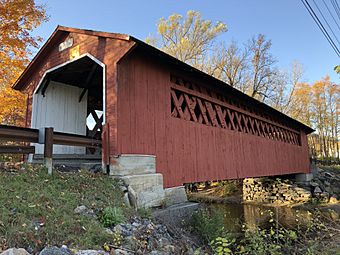Silk Covered Bridge facts for kids
Quick facts for kids |
|
|
Silk Covered Bridge
|
|

Bridge in October, 2020
|
|
| Nearest city | Bennington, Vermont |
|---|---|
| Built | 1840 |
| NRHP reference No. | 73000190 |
| Added to NRHP | August 28, 1973 |
The Silk Covered Bridge is a special kind of bridge called a covered bridge. It carries Silk Road over the Walloomsac River in Bennington, Vermont. This historic bridge was built way back in 1840. It is a Town lattice truss bridge, which is a unique way of building bridges.
The Silk Covered Bridge is one of three covered bridges found close together along the Walloomsac River. Because of its history and design, it was added to the National Register of Historic Places in 1973.
Contents
Exploring the Silk Covered Bridge
The Silk Covered Bridge is located between downtown Bennington and North Bennington. It sits on Silk Road, connecting two other roads, Vermont Route 67A and Vermont Route 279. The bridge is in a quiet, natural area.
How the Bridge is Built
The bridge crosses the Walloomsac River, which flows west. The northern end of the bridge rests on its original stone foundation. This old stone has been covered with concrete to make it stronger. The southern end has a newer concrete foundation.
The Silk Covered Bridge uses a special design called a Town lattice truss. This design uses many crisscrossing wooden beams to create a strong structure. The bridge is about 88 feet (27 m) long. It has one lane for cars, which is about 15 feet (4.6 m) wide.
The sides of the bridge are covered with wooden boards that stand up straight. The openings where cars enter and exit, called portals, also have vertical boards inside. The outside of these portals has horizontal boards. In the middle of the bridge, the side boards do not go all the way to the top. This allows you to see the wooden truss structure inside.
The History of the Silk Covered Bridge
The Silk Covered Bridge was likely built in 1840. A person named Benjamin Sears probably built it. His family was well-known for building bridges in the area.
Other Nearby Bridges
The Sears family also helped build the Paper Mill Village Bridge. This bridge is a short distance downriver from the Silk Covered Bridge. Another bridge nearby is the Burt Henry Covered Bridge. All three of these historic covered bridges are located along a 2-mile (3.2 km) stretch of the Walloomsac River.
Recent Repairs
On August 28, 2011, the Silk Covered Bridge was damaged. Heavy floodwaters from Hurricane Irene caused the damage. Luckily, the bridge was repaired and reopened for use.
 | Kyle Baker |
 | Joseph Yoakum |
 | Laura Wheeler Waring |
 | Henry Ossawa Tanner |



